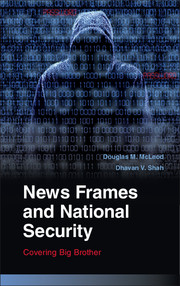Book contents
- Frontmatter
- Contents
- Preface and Acknowledgments
- Introduction
- Part I Conceptual Framework
- Part II Framing Effects Research
- 3 Designing the Studies
- 4 Converging Cues and the Spread of Activation
- 5 Cognitive Complexity and Attitude Structure
- 6 Security Concerns and Tolerance Judgments
- 7 Group Perceptions and Expressive Action
- Part III Implications and Conclusions
- Bibliography
- Index
5 - Cognitive Complexity and Attitude Structure
Published online by Cambridge University Press: 18 December 2014
- Frontmatter
- Contents
- Preface and Acknowledgments
- Introduction
- Part I Conceptual Framework
- Part II Framing Effects Research
- 3 Designing the Studies
- 4 Converging Cues and the Spread of Activation
- 5 Cognitive Complexity and Attitude Structure
- 6 Security Concerns and Tolerance Judgments
- 7 Group Perceptions and Expressive Action
- Part III Implications and Conclusions
- Bibliography
- Index
Summary
“Our enemies operate secretly and they seek to attack us from within. In this new kind of war, it is both necessary and appropriate for us to take all possible steps to locate our enemy and know what they are plotting before they strike.”
– U.S. Attorney General Alberto Gonzalez Testimony before the U.S. Senate Judiciary Committee February 6, 2006“I know for an absolute fact that we have not been involved in anything related to promoting terrorism, and yet the government has collected almost 1,200 pages on our activities. Why is the ACLU now the subject of scrutiny from the FBI?”
– Anthony. D. Romero ACLU Executive Director July 16, 2005As the United States government took actions to engage in surveillance of activist groups, the discourse surrounding this action straddled both sides of the national security/civil liberties dichotomy. Some officials, such as Attorney General Alberto Gonzalez (quoted above), made the argument that such government activities are necessary to protect the safety and security of the American public. On the other hand, civil rights advocates such as Anthony Romero, the ACLU’s Executive Director, questioned whether activist group surveillance wasn’t motivated by political rather than security concerns. As discussed earlier, this national security/civil liberties debate was played out for public consumption through the mass media. Audience members seeking to understand the debate over government surveillance activities had to make judgments about what was happening on the basis of information reported in the media. This led us to ask questions about how the audience would make sense of this controversy in response to the news stories that they encounter.
In this chapter, we examine how different frames used to construct such new stories affect audience understanding and cognitions. As we noted in Chapter 1, frames are likely to affect people differently according to the predispositions that they bring to the processing of news stories. As such, this chapter examines the interplay of news frames and political predispositions on audience reactions to news stories. For this analysis, we used data from the Activist Study in which research participants read news stories about the surveillance of political advocacy groups under the USA PATRIOT Act.
- Type
- Chapter
- Information
- News Frames and National SecurityCovering Big Brother, pp. 115 - 128Publisher: Cambridge University PressPrint publication year: 2014

